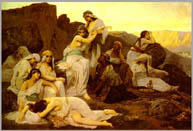Monday, September 12, 2005
Jephte, an oratorium by G. Carissimi, september 17, 2005 11h, Jacobus Kerk Enschede.

My choir montessera, the soloists Ilse van Griensven, Govert Valkenburg and Steffen Posthuma will perform Jephte, a beautiful oratorium by G. Carissimi (1605-1674). The choirs Il crocodillo cante and kamerkoor twente will perform "Musikalische Exequien" van H. Schütz. Both choirs are conducted by Jeanet Bosch. The performances are part of the Enschede Muziek Festival . You need a festival button to attend this, and many other performances. Choir members, like me, sell them for 5 euro.
time : saturday september 17 2005 11:00h.
location : Jacobus kerk Enschede
requires : festival button for 5 euro
Carissimi's oratorium Jephte is something like a small opera. The storyline, indeed large parts of the (latin) text, come straight from Judges 11. It is a dramatic story. Jephte (Jephthah) is called upon by the people of Israel to lead them into battle against the Ammonites. If you have just read Judges 11, you know that Jephte has an axe to grind, being the illegitimate son of Gilead and having been send away from his ancestral home for that reason. We are also informed that the casus belli echos problems we are only too familiar with in 21st century middle east: fertile lands have been promised to different people by their different gods. In Carissimi's Jephte this information is ignored. The historian (sung by the bass Steffen Posthuma) merely explains that the Ammonites have not been behaving reasonably and that Jephte is forced to lead Israel into battle against them. Then the central drama is set in motion: Jephte (sung by the tenor Govert Valkenburg) promises to sacrifice as a burn offer (holocaustum) the first being that will come from his house (primus de domo mei) if he is victorious. It is a solemn oath to plea for the favours of a jealous God. Jephte needs all the help he can get, and Israel is in great danger but it is a reckless gamble none the less. My girlfriend told me that her mother would tell her that Jephte expected his little dog to greet him. Cruel enough for a child, but Jephte lives in an age when human life had a different value, certainly of less value than honour and glory.
Jephte goes into battle and fights. He and his army drive back the heathens (fugite!, cedite! impii!, flee!, backward!, thy heathens!), and the Ammonites run for it (corruite). Twenty Ammonite cities are wiped of the earth in one big sweep. Finally, the Ammonites are humiliated before the Israellites while loudly lamenting their fate. Interestingly, Carisimi makes this "ululantes" sound very sad, it is the victims that we hear lamenting. An alternative interprestation is that victory marks the point where there is no going back and fate will take its inevitable course. Jephte promised sacrifice to God on victory, and God has delivered. In the next "scene", Jephte lives his finest hour: all of Israel is praising its leader in war who bestowed them with glory, honour and victory (laudemus belli principem, qui dedit nobis gloriam et Israel victoriam).
Returning home, his daughter, his only child, comes out of the door with tambourines to sing his praise. Fate has struck. Jephte immediately realises what has happened and cries out in pain to his daughter (heu, heu filia mea). His oath has entangled both of them in the web of fate (decepisti sum, et tu pariter). Jephte's daughter (sung by Ilse van Griensven) while seeing her father's anguish, fails to understand it (cur pater, decepisti sum). So Jephte, howling of sorrow, explains that he has sworn to God will have to sacrifice her in a burn offer. Jephte's daughter accepts fate. She offers herself as a sacrifice for the glorious victory of her father and her people(ecce, filia tua uni genita, echoing the ecce homo of Gods only son Christ) . She merely begs for one favour. Jephthe is only too glad to offer some comfort, however small, to her grave heart. She wants to go into the hills with her girlfriends to mourn. Jephte sends his daughter to the hills (Vade, filia). She mourns her virginity, mourns not bearing a son that will weep at her tomb, mourns not living life now that everybody rejoices victory. She wants the valeys and caves to echo with horrifying sounds, reminding me of natures reaction to Christs death so vividly described by the Blitzen und Donner in Bach's passion according to st. Mathews . In the grand final chorus (plorate filii Israel) all weep for her, the dissonants of the lamentamini making her pain audible.

The virgins lamenting Jephtes daughter
We spend a long time rehearsing the piece and it took a long time before the pieces finally came together. Sometimes, rehearing is frustrating, you feel like you don't make any progress. However, we have lots of good laughs in between, and I generally come home singing sotto voce and feeling happy after rehearsals, even after being scolded by Jeanet (our conductor) for not practising enough. And performing such a piece with the accompanying instruments, hearing how the main drama between Jephte and his daughter is unfolding between Ilse and Govert is enough to give you goose bumps[1]. We performed the piece twice before in a joint concert with Novafonie , and it was a great succes. I hope we will be at least as succesful this time.
[1] Steffen does a great Job too, but Carissimi has not given the historian as dramatic a role.
Comments:
© Copyright 2004-2006 Rogier Brussee.
Hi Brother, nu jij mijn blog bekeken en geprezen hebt, moest ik naturrlijk ook even bij jou kijken. Heb geinteresseerd zitten lezen hoe dat ook al weer zat met jephta en de offerbelofte.
'k zou wel een keer ander jasje instellen voor je schrijfsels, want deze vind ik een beetje...saai...
Post a Comment
'k zou wel een keer ander jasje instellen voor je schrijfsels, want deze vind ik een beetje...saai...
These are my personal views and do not necessarily reflect those of my employer.
